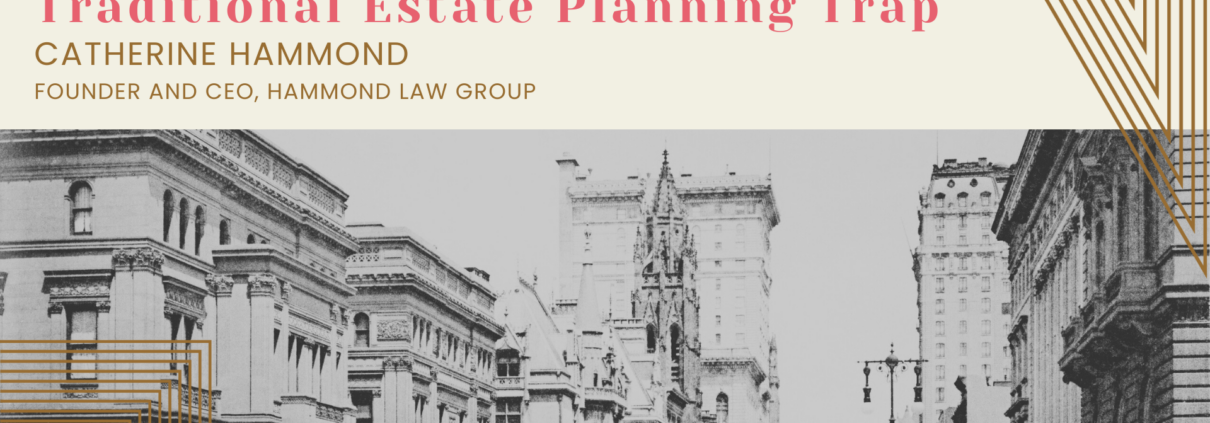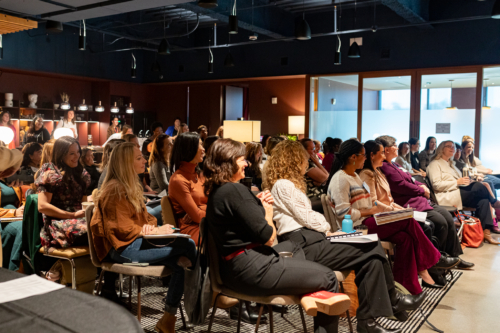Lasting Legacies: Escaping the Traditional Estate Planning Trap
Written by Catherine Hammond
Founder & CEO, Hammond Law Group

In estate planning, most people dream of making things as easy as possible for their loved ones and passing down wealth in a way that benefits their children or other beneficiaries. What most people don’t realize when doing traditional estate planning – simply writing a will or trust – is the “rags-to-riches-to-rags” trap. This refers to the unfortunate pattern where families build wealth, only to dissipate within one or two generations. A good, comprehensive estate plan can ensure that the money you’ve worked hard for benefits your family for years to come and doesn’t become a fleeting memory.
Understanding the “Rags-to-Riches-to-Rags” Trap
It’s a story many of us have heard: a hardworking parent builds wealth through years of sacrifice and dedication. They leave money and other assets to their children, but by the third generation, the wealth is gone. Studies show that nearly 70% of inherited wealth is lost by the second generation, and 90% by the third. This happens because heirs are either unprepared to manage their inheritance responsibly, or the estate plan lacks the necessary tools to ensure long-term wealth preservation.
But, there are ways to break this cycle and create a lasting legacy.
Financial Education: A Key to Preserving Wealth
One of the most critical components of wealth preservation is financial education. Heirs who are well-equipped with the knowledge and skills to manage their inheritance are far less likely to squander it. Parents and grandparents can help future generations by:
- Encouraging open conversations about finances and wealth management.
- Teaching budgeting, investing, and the principles of wealth accumulation.
- Providing opportunities for heirs to practice managing smaller amounts of money before inheriting large sums.
Including financial literacy as part of your estate plan sets a foundation for future generations to appreciate and responsibly manage the wealth they inherit.
Leaving a Legacy That Truly Lasts
While financial assets are important, they’re only part of the puzzle. Adult children say the non-financial part of your legacy is ten times more important than your money. Money is a tool to support your dreams and theirs, but what really matters when you’re gone is leaving more of you. Cultivating and expressing your wisdom, life story, and love in a lasting way will give your heirs what money can’t buy. By sharing the stories behind how your wealth was created and the principles that guided your success, you can inspire future generations to use their inheritance wisely.
We are all connected, especially through generations within the same family. Not only do we learn from each other, but epigenetics has shown us that the challenges in your life will show up in some way for your children, grandchildren, and great-grandchildren. Leaving your story and the hard-won wisdom you’ve gained will help your descendants understand themselves, their lives, and the world at a level that will empower them to build their own legacies of resilience and strength no matter what life throws their way.
Leaving your human capital along with your financial capital is the best way to truly take care of your loved ones even after you’re gone.
Estate Planning Tools to Secure Generational Wealth
In addition to preparing your heirs with education and human capital, there are a number of estate planning strategies that can help ensure the longevity of your wealth:
- Revocable Living Trust: Establishing a trust can protect assets from your beneficiaries’ future divorce (50% of marriages do not last), inexperience, and poor financial decisions. Trusts also provide flexibility, allowing for staggered distributions or conditional payouts that incentivize positive behavior and responsible financial choices.
- Healthcare Directives: To stay in control of your healthcare decisions even if you’re unable to communicate them at some point, you need three types of healthcare directives. A Healthcare Power of Attorney names someone to make your decisions when you can’t. An Advance Directive expresses your wishes for what kinds of care you do and do not want. Finally, a Universal HIPAA release is required for every adult over the age of 18 for your loved ones to talk to the hospital or doctors about the basics of medical care.
- Professional Guidance: Engaging a qualified, independent financial advisor, an elder care coordinator, and an estate planning attorney can ensure that your wealth is managed and passed down properly. This professional oversight can help safeguard assets from common pitfalls and provide an additional layer of protection.
Securing Both Financial and Non-Financial Legacies
Passing down wealth is about more than just transferring money, it’s about supporting those you love in living good lives even after you’re gone. By cultivating and passing on both your financial and human capital, you can escape the rags-to-riches trap and create a positive legacy that lasts for generations.
And please don’t wait until you think you need an estate plan. The biggest mistake people make is waiting until it’s too late. You never know when something unexpected might happen, so give yourself and your loved ones a gift by planning today, while you can.
For more information on estate planning or to discuss how we can help you preserve your wealth for future generations, contact us today at ColoradoEstatePlan.com.





